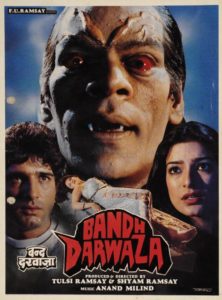 The infamous Ramsay Brothers made this 1990 horror fest, one of the last entries in India’s “Gloom Boom” period of genre cinema. A quintessentially Bollywoodian take on Dracula, this two-and-a-half-hour mind-roaster will appeal to viewers who don’t mind romance, music numbers, slapstick and martial arts mixed in with their scares.
The infamous Ramsay Brothers made this 1990 horror fest, one of the last entries in India’s “Gloom Boom” period of genre cinema. A quintessentially Bollywoodian take on Dracula, this two-and-a-half-hour mind-roaster will appeal to viewers who don’t mind romance, music numbers, slapstick and martial arts mixed in with their scares.
BANDH DARWAZA is generally credited with being one of the Ramsay Brothers’ more accomplished efforts, but it was unsuccessful at the box office, and helped put an end to the Indian horror boom that was kicked off by the 1984 release of the Ramsays’ seminal PURANA MANDIR.
In fact, the Bombay-based Tulsi and Shyam Ramsay had been making horror-themed films since the 1970s, and later turned their attentions to television. Shyam attempted a theatrical comeback in 2003 with DHUND: THE FOG, but that film was strictly a case of far too little, way too late.
But onto the story of BANDH DARWAZA, which begins with a desperate young bride journeying to the forbidding Black Mountain. A magician resides there who the woman asks for help in conceiving a child. The magician, an evil fuck known to his cohorts as the Prince of Darkness, agrees to assist her but demands that if the offspring be female he gets it. The child is indeed a girl, but the woman and her husband refuse to go through with the pact, instead killing the magician—who just before kicking off promises that he’ll be back!
Cut to several years later: the child is now an attractive young woman named Kaamya. She’s in love with the strapping Kumar, but he has his eye on another young woman named Sapna. This turn of events delights the residents of Black Mountain, a maniacal sect dedicated to bringing the Prince of Darkness back to life. They use Kaamya’s dark mood to lure her into their fold so they can drip Kaamya’s blood on the Prince’s corpse, which is done by slashing her hand and having one of the sect members hold it over the POD’s open casket.
Resurrected, the Prince makes good on the bargain he made with Kaamya’s parents, keeping Kaamya chained up in an inner room of his castle and enslaving her mind through sex and vampirism. He only lets her out to find victims from which he drains the blood. But Kumar and Sapna are worried about Kaamya, and make periodic raids on the castle to rescue her. It’s all to no avail, though, as the POD’s powers are pretty formidable. He does have his weaknesses, however…
You’ll know in the first five minutes of BANDH DARWAZA whether you like it or not—and by extension whether you respond to Bollywood cinema in general. Wildly melodramatic emoting, dumb-ass slapstick, gooey sentimentality, overwrought kung fu fights and horror of the most blatant variety imaginable (every scare is telegraphed by noisy music cues) are all constants, and so are the obligatory music numbers that periodically interrupt the action.
Another notable element is the sexual content, which is as blunt as that of any Indian movie I’ve seen. Indian cinema is among the most heavily censored in the world, yet here we’re presented with highly suggestive shots of a scantily clad chained-up woman writhing in a sexual frenzy, and, even better, that same woman being approached by the film’s vampiric adversary with his hands covered in goopy fluid.
Unfortunately, 145 minutes of such puddle-deep cinemadness is just too much, especially given the total lack of nuance or craftsmanship on the part of the filmmakers. For me a terminal case of sensory overload set in around the two hour mark, with the remainder of the film a blur. Too bad, as the final scenes are among BANDH DARWAZA’S best, with a goodly amounts of breakneck action, bloodletting and general insanity.
Vital Statistics
BANDH DARWAZA
Tulsi Ramsay Films
Directors: Tulsi Ramsay, Shyam Ramsay
Producers: Tulsi Ramsay, Shyam Ramsay
Screenplay: Shyam Ramsay
Cinematography: Gangu Ramsay
Editing: Keshav Hirani
Cast: Hashmat Khan, Manjeet Kular, Ajay Agarwai, Kunika, Vijayendra Ghatge, Satish Kaul, Anita Sareen, Anirudh Agarwal, Aruna Irani, Shamsher Khan, Raza Murad, Beena Banerjee, Johnny Lever, Ashalata Waghdegare
